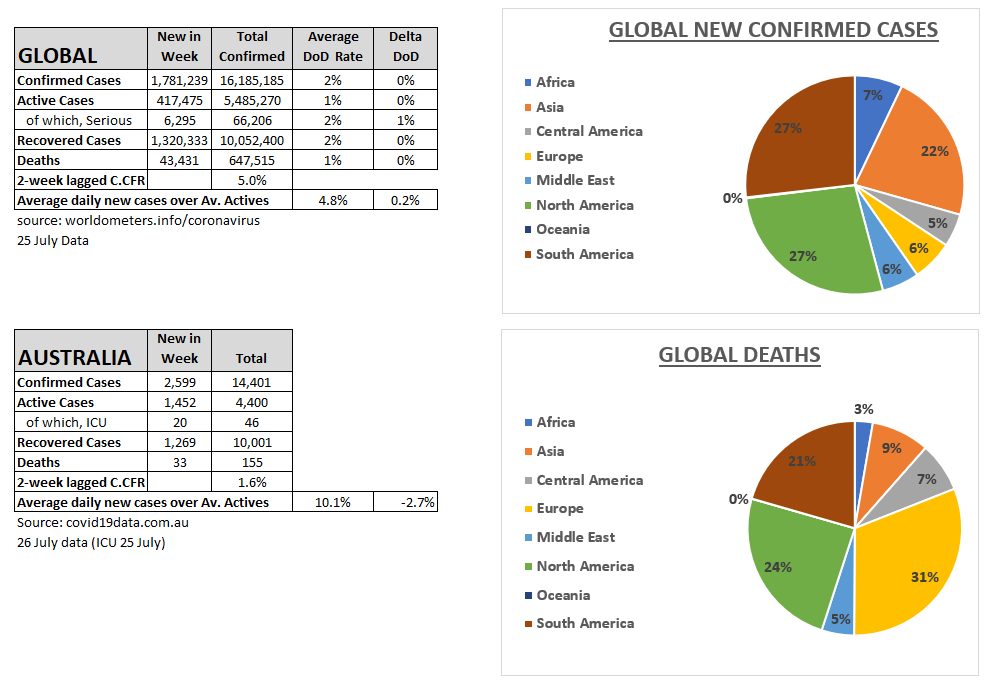
Covid-19 Blog
COVID-19 Monday Roundup 27 July 2020
In a week when COVID-19 cases reached records both globally and in Australia, the UK and US governments signed deals with vaccine manufacturers which may delay access for other countries. Early trial results suggest the drug interferon-beta may significantly reduce severe disease and death from COVID-19. And Insurers will be carefully watching test cases brought by regulators on Business Interruption insurance.

World Summary – 25 July
- The pandemic delivered the four highest daily new case counts this week and the 3rd highest death count.
- At 3%, deaths as a percentage of new cases (two week lag) have begun to increase, having declined steadily in recent months.
- 62% of new cases were in the USA, Brazil and India; and 26% were in just 19 other countries with over 10,000 new cases each, headed by South Africa with 83,000, 4.7% of the weekly total, and a welcome reduction in that country.
- Brazil, USA, India, Peru and Mexico accounted for 66% of all deaths this week with over 4000 deaths each. Another three countries had over 1,000 deaths each.
- In addition to the US, Brazil and India, there are large uncontrolled outbreaks in four other South and Central American countries and in Israel and Indonesia. In Europe, Russia is bringing their outbreak down very slowly, and in the Middle East, most outbreaks are coming back under control.
Australia Summary – 26 July
- Victoria dominates the Australian situation with 2,485 new cases, up 24%, 96% of all new cases this week. Daily new case numbers remain high, but the better news is that they have flattened somewhat.
- We’ve had our highest weekly deaths, all in Victoria, and including a 40 year old male.
- NSW had 104 new cases, up 14%, but the situation in NSW does not appear to be out of hand. While most cases are linked to the Melbourne outbreaks, it’s clear that the disease can spread rapidly and widely if social distancing is not observed.
- The rest of the country had just 10 cases, traced principally to overseas returns.
- In NSW, as well as tighter restrictions now in place for cafes, restaurants, weddings and funerals, hospital staff are also now required to wear masks within 1.5 metres of patients, as NSW Health raised the risk level to amber.
- Mask wearing became mandatory in Melbourne this week. Additional measures to support Victorian aged care providers, include workforce funding support to reduce workforce sharing, infection control training, increased testing and additional care capacity at outbreak sites.
Key market update
- The Federal Government’s economic and fiscal update estimates real GDP will increase by 2.5% in 2021 (-0.75% in 2020) and government debt will increase from 24% to 35% of GDP by next year. Unemployment is expected to peak at around 9%. Commentary on the update was published by KPMG, EY and Deloitte.
- Australian retail turnover rose 2.4% in June 2020, and 8.2% compared to June 2019, led by cafes, restaurants and personal retail as COVID-19 restrictions eased.
- JobKeeper has now been extended until 28 March 2021 while the JobSeeker payment will fall from $1,100 to $800 a fortnight in September.
- S&P Global Ratings reaffirmed Australia’s AAA credit rating but maintained a negative outlook. Moody’s has warned that state government debt will increase by almost $50 billion this year.
- APRA published FAQs on superannuation Pandemic Data Collection requirements
- EY notes that Insurance companies’ intent to divest remains strong while divestment is a core pillar of resilience for the Banking sector.
- Natural Catastrophe losses and COVID-19 weigh heavy as QBE and IAG update on results to 30 June 2020. QBE is expecting a $335 million impact from COVID whereas IAG reported a broadly neutral COVID impact on its insurance margin.
- AFCA has identified two complaints for a test case on Business interruption (BI) wordings. Meanwhile the UK BI test case brought by the FCA has commenced hearings this week. Insurers could face a $535 million hit on COVID-related BI claims assuming favourable court challenge decisions.
- Emirates airline has introduced cover for medical and quarantine costs for passengers contracting COVID-19 within 31 days of commencing their journey.
- Lloyd’s of London’s newest “syndicate in a box,” Syndicate 1796, has been set up to insure storage and transportation of COVID-19 vaccines to emerging economies.
New COVID-19 research this week
- This week three vaccine candidates published positive results in Phase one and two trials: US-based mRNA-1273, UK-based ChAdOx1 nCoV-19 and China-based Ad5-vectored COVID-19 Pending phase three trials, Pfizer has agreed with the US government to produce up to 600 million vaccine doses and could begin delivery by Q4 2020, while the UK Government has signed deals with three companies to manufacture some 230 million doses. It is understood Australia would be first in line for the University of Queensland’s vaccine if successful, though no formal commercial deal has been announced.
- Synairgen’s interferon-beta, a drug typically used for multiple sclerosis, has shown promising early results. Patients had a 79% lower risk of developing severe disease compared to placebo and were more than twice as likely to recover from COVID-19.
- Machine learning has been used to create a Risk assessment tool for the onset of severe or critical COVID-19 illness.
- Australian researchers have shown a triple-layer mask is most effective in preventing spread of droplets, but even a single layer cotton mask reduces spread.
- The Australian Institute of Health and Welfare published Australia’s Health 2020. Chapter 2 includes a summary on the pandemic in Australia up to May 2020.
- Older children aged 10–19 years might spread SARS-CoV-2 to household members more readily than adults, suggests astudy in South Korea. When the index patient was aged 10–19 years, 19% of household contacts were infected, compared to 12% and 5% when the index patient was aged 30–49 and 0–9 respectively.
- SARS-CoV-2 RNA was detected inblood donated 40 days after the donor’s symptoms had resolved and the patient had tested negative. The finding is concerning as screening for SARS-CoV-2 is not currently undertaken in the general blood donor population, and the infectivity from blood remains unknown.
- Differences in case fatality rates across nine countries have largely been explained by thedifferent age profiles of those tested. Germany focused on testing young people resulting in a low case fatality rate of 0.7%, compared to 9.3% in Italy where most testing was among older individuals.
New on the Actuaries Institute website this week.
This work is licensed under a Creative Commons Attribution-NonCommercial-No Derivatives CC BY-NC-ND Version 4.0.
CPD: Actuaries Institute Members can claim two CPD points for every hour of reading articles on Actuaries Digital.






